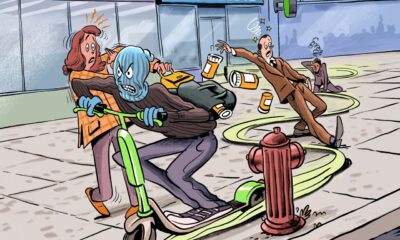Science
California’s Magic Mushrooms: Legal Status and Local Movements

The legal landscape surrounding magic mushrooms in California is evolving, with increasing public interest in the status of psilocybin and its potential therapeutic uses. As of now, possession, sale, or consumption of psilocybin mushrooms remains illegal under both state and federal law, classified as a Schedule I controlled substance. Nevertheless, cities like San Francisco and Oakland have taken steps towards decriminalization, reflecting a growing movement to explore the medicinal potential of these mushrooms.
Understanding Psilocybin and Its Effects
Magic mushrooms contain the psychedelic compounds psilocybin and psilocin. When ingested, psilocybin is converted into psilocin, leading to alterations in perception, mood, and thought processes. Users often report vibrant visual experiences, emotional shifts, and profound feelings of connection or introspection. The effects generally begin within twenty to forty minutes of consumption and can last for approximately four to six hours. Given the intensity of these experiences, it is advisable for users to have a trusted friend present during their journey to navigate potential overwhelming sensations.
Current Legal Status of Magic Mushrooms in California
Despite the decriminalization efforts in specific cities, the legal status of magic mushrooms in California remains complex. As of now, under state law, psilocybin usage carries significant legal risks, with serious penalties for violations according to the law firm Segura & Kiatta Criminal Defense. Individuals facing charges related to psilocybin should prioritize obtaining experienced legal counsel to navigate the implications of these laws.
The discussion surrounding psilocybin’s legal status is intensifying, particularly as communities advocate for a shift in focus from punitive measures to health-related considerations. The decriminalization movement is gaining traction, with cities like San Francisco and Oakland leading the way in urging law enforcement to deprioritize psilocybin-related offenses. This shift is partly fueled by growing research into psilocybin’s therapeutic potential, particularly for mental health conditions.
Local Initiatives and Decriminalization Efforts
California’s movement towards reconsidering its stance on magic mushrooms is largely driven by local initiatives. Cities such as Oakland and Santa Cruz have successfully passed measures that prioritize the decriminalization of psilocybin. These actions reflect a broader shift towards viewing personal use of magic mushrooms as a matter of individual liberty and health rather than criminal activity. Grassroots groups are mobilizing support, encouraging residents to advocate for similar measures in their communities.
The growing public awareness regarding the potential benefits of psilocybin in mental health treatment is influencing these local legislative efforts. Keeping informed about the changing legal landscape surrounding magic mushrooms is essential for residents who may wish to participate in or support these initiatives.
Medicinal Use and Research Developments
As decriminalization efforts progress, researchers are increasingly exploring the medicinal applications of psilocybin. Studies are investigating its effectiveness in treating mental health disorders such as depression, anxiety, and post-traumatic stress disorder (PTSD).
Promising results from clinical trials indicate that psilocybin-assisted therapy can lead to significant symptom reduction for some patients. In recognition of its potential, the U.S. Food and Drug Administration (FDA) has granted psilocybin a breakthrough therapy designation for the treatment of depression. Ongoing research will likely shape future mental health protocols and expand the understanding of psilocybin’s therapeutic properties.
Risks and Considerations for Users
While exploring the potential benefits of magic mushrooms, it is equally important to acknowledge the risks involved. Users may experience unpredictable psychological effects, which can lead to anxiety or paranoia during their trip. Those with a history of mental health issues should approach psilocybin with caution, as it may exacerbate existing conditions.
Furthermore, while some cities have decriminalized psilocybin use, individuals can still face legal consequences related to possession or distribution. It is crucial for users to remain aware of their local laws and to ensure they are properly identifying mushrooms, as misidentifying a toxic variety can have serious health implications.
As the dialogue surrounding magic mushrooms continues to evolve, staying informed about legal changes and ongoing research will be vital for residents in California and beyond.
-

 Technology5 months ago
Technology5 months agoDiscover the Top 10 Calorie Counting Apps of 2025
-

 Health3 months ago
Health3 months agoBella Hadid Shares Health Update After Treatment for Lyme Disease
-

 Technology2 weeks ago
Technology2 weeks agoOpenAI to Implement Age Verification for ChatGPT by December 2025
-

 Health3 months ago
Health3 months agoErin Bates Shares Recovery Update Following Sepsis Complications
-

 Technology4 months ago
Technology4 months agoDiscover How to Reverse Image Search Using ChatGPT Effortlessly
-

 Health3 months ago
Health3 months agoAnalysts Project Stronger Growth for Apple’s iPhone 17 Lineup
-

 Technology3 months ago
Technology3 months agoElectric Moto Influencer Surronster Arrested in Tijuana
-

 Technology1 month ago
Technology1 month agoDiscover 2025’s Top GPUs for Exceptional 4K Gaming Performance
-

 Technology5 months ago
Technology5 months agoMeta Initiates $60B AI Data Center Expansion, Starting in Ohio
-

 Technology5 months ago
Technology5 months agoRecovering a Suspended TikTok Account: A Step-by-Step Guide
-

 Health5 months ago
Health5 months agoTested: Rab Firewall Mountain Jacket Survives Harsh Conditions
-

 Lifestyle5 months ago
Lifestyle5 months agoBelton Family Reunites After Daughter Survives Hill Country Floods





















